Early Years Foundation Stage (Reception)
The Bristol Standard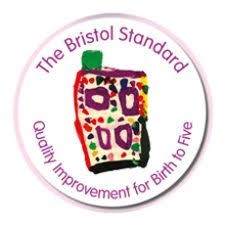
We are delighted to have recently been awarded the Bristol Standard. The Bristol Standard is a self-evaluation framework that we use in reflective discussions to identify current strengths and targets for improvement.
The Bristol Standard is recognised nationally and internationally as an outstanding framework to support a journey of continuous improvement.
The validation panel recognised that our values, Enjoy Explore Excel together -be amazing! are central to everything we do in the EYFS. They felt that our families are welcomed on our exciting learning journey from the outset through home visits and the inspirational learning opportunities we provide. The panel also recognised that Play and creativity are at the heart of everything we do, which is enhanced by adopting Greg Bottrill's approach. Children are empowered to learn through play, thoughtful provocations and the environments we create.
The panel highlighted our deep understanding of children's PSED and they enjoyed reading about how our curriculum celebrates neurodiversity and enables meeting children where they are in the moment. It is clear that the setting develops a unique holistic view of the child where they are able to thrive.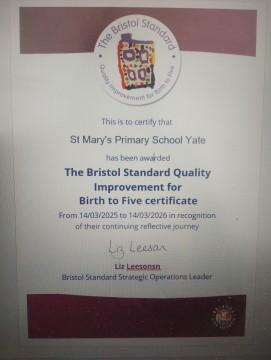
Intent – why do we teach what we teach?
Here at St Mary’s we aim to give every child the very best start possible to their education. Through our curriculum, we intend to provide our children with the knowledge and skills they need to thrive and be successful in the world.
In reception, we work hard to embed positive attitudes towards school and aim to foster a genuine love and enthusiasm for learning. Our enabling environments and warm, skilful adult interactions support the children to flourish and be the best versions of themselves. We encourage children to be curious and ask questions, deepen their understanding of the world around them and develop and share their own opinions. We aim to support all children to reach their potential in our setting by aiming high, being ambitious and always being ready to find different ways to engage with our children, changing our approaches whenever necessary and removing any learning barriers.
We teach the EYFS learning skills through play and our engaging environments. Play creates the conditions for children to test the world, to make sense of it and to grow the skills needed to communicate, to negotiate and to express their inner selves.
We are passionate about education being an adventure and try and make sure that our children experience something really special within our EYFS setting. We use the power of play and the magic of childhood to engage and inspire our children to be curious and imaginative learners. The play in our classrooms is wholeheartedly led by children, firmly rooted in their imaginations, their dreams and their wonderings. As practitioners we are the children’s co-adventurers, equally as curious and wondrous, ready to deep dive into each and every adventure the children want to go on.
Implementation – How do we teach what we teach?
The Early Years Foundation Stage sets standards for the learning development and care of children.
The areas of learning are:
- Communication and language
- Physical development
- Personal, social and emotional
These areas are particularly important for building a foundation for igniting children’s curiosity and enthusiasm for learning, forming relationships and thriving.
There are also four other areas, through which the above areas are strengthened and applied:
- Literacy
- Mathematics
- Understanding the world
- Expressive arts and design
Our children learn through a balance of child-initiated and adult-directed activities. The timetable is carefully planned to ensure daily high quality inputs in English, Maths and Phonics. These sessions are followed by small group work where the children are able to work with a member of the team on their next steps in learning. This enables the team to continually check for understanding and quickly address any misconceptions and provide verbal feedback in the moment.
Explore and Learn Time
We ensure the timetable reflects our child-led approach by making sure there is plenty of time in the day for the children to explore the provision and follow their interests. The curriculum is reflected in both the inside and outside space and equal importance is given to learning in both areas. We recognise the enormous benefits being outside in nature has to offer out young children in terms of their emotional wellbeing and we encourage it in all weathers.
The Characteristics of Effective Learning
Making observations, and knowing how to support children as individuals, is at the heart of understanding the importance of the characteristics of effective learning in the EYFS.
The Characteristics of Effective Learning are as follows:
- Playing and Exploring
- Engagement
- Finding out and exploring
- Playing with what they know
- Being willing to ‘have a go
- Active learning
- Motivation
- Being involved and concentrating
- Keeping trying
- Enjoying achieving what they set out to do
- Creating and thinking critically
- Thinking
- Having their own ideas
- Making links
- Choosing ways to do things
As a setting we ensure that we are providing opportunities for our children to explore and develop behaviours that will enable them to learn. The classrooms are always active and the children are involved in their own learning and encouraged and supported to take responsibility for their personal development. We have designed our classrooms to ensure that they are a collaboration between practitioners and children and we believe that this creates an environment that puts the needs of the children first.
Groups of children work together on ‘Carpet Kingdom’, around a table or in the provision and are encouraged to share ideas and collaboratively work to solve problems. This requires cooperation and collaboration which are two of the most effective ways to learn.
We value questions over answers and ensure that we involve the children in every aspect of their day from when they choose to eat snack, what resources they would like to see in the provision and who they might like a visit from or where they might like to go.
Our children learn from what they see around them and therefore we model the process of leaning demonstrating persistence, curiosity, creativity and collaboration to the children on a continual basis.
The children partake in weekly 'Jigsaw' activities and the Characteristics of Effective learning are identified and developed in every session.
Greg Bottrill
Greg is the author of Can I go and Play Now and School and the Magic of Children. He is an experienced early year’s practitioner who is passionate about the true role of play. He is committed to enabling children to be at the centre of their own development and their own learning. Through attending numerous training sessions delivered by Greg, plus his visit to our school, we have been able to fully embrace his approach in our provision.
Story Dough
We introduce the children to the joy of Story Dough as soon as they step foot in our classrooms. It is a simple yet powerful way to add the skills of language, fine motor, mark making and imagination to the children's day. It is a great way to prepare the children for Drawing Club later on in the term. We wake the play dough up with a song, invent something wonderful and attach a secret symbol to it before singing it back to sleep again.
Drawing Club
In Reception, we love books and stories, and through Drawing Club, we open up the magic world of tales and stories to children whilst at the same time enriching their language and writing skills, developing their fine motor and sharing really special time with them. Drawing Club immerses children into a world full of imagination where anything can happen and often does. Drawing is incredibly powerful and when we combine it with story we are able to see how a child’s imagination perceives our Story World. Drawing Club takes place every single day and we explore the characters, setting and put our own twist on the story through our adventure time.
As well as being exciting, the books we choose are linked to our Global Curriculum and help us to answer our Big Question each term.
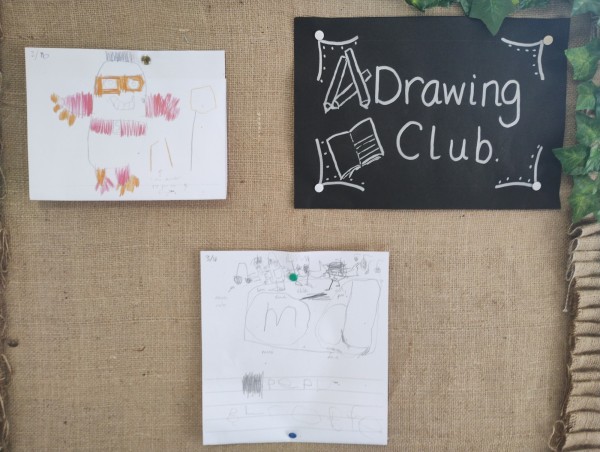
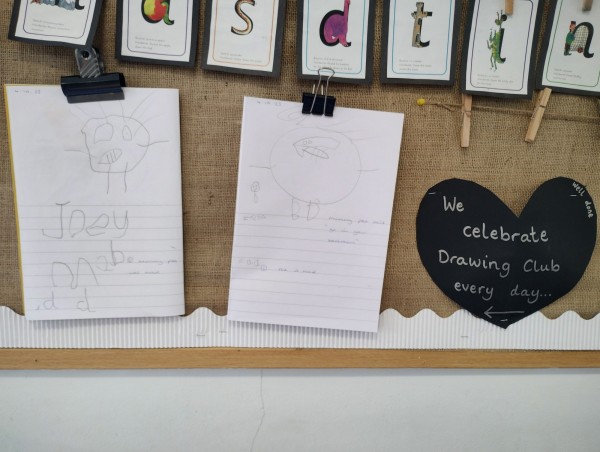
The message Centre
Young children need to feel three things when they write and mark make: joy, purpose and magic. The Message Centre delivers all three of these in bucket loads. A simple rebrand of writing and messaging offers both the children and us adults a delight in what might otherwise be a struggle. When messaging takes off, it is simply magical! Children want to message – they love its simplicity and its warmth and as the children’s co-adventurers, we are able to elevate their play and deliver the curriculum in a very individual and unique way. Secret symbols start popping up around the room, appearing in shoes and being stuck on backs. Toys become magical and stuck in a force-fields through the use of passcodes and single words and later with captions and phrases.
Adventure Island and Play Projects
Based around the concepts of joy and co-playing, Adventure Island is an imaginary place that we build with the children across the year.
Adventure Island is a world inside this world and it really enables the children to stop and notice and live very much in the moment. We will find Hoddy Dod’s footprints up in the trees or perhaps spot movement behind the church spire which might start us wondering if Riddle Diddle is about to pay us a visit. If we see the grass rustling, it might mean the Fidgets are near or if we hear rumblings underground, it might mean the Poggle is digging out more underground tunnels again. Of course, all of these characters have secret symbols and numbers and we use objects around the provision as portals. Messages come out of these portals from the characters and we put messages back in to them. The island’s inhabitants show us how to live with courage, resilience, respect and in solidarity. We are looking after the children’s wellbeing through a living story book exploring a whole range of emotions.
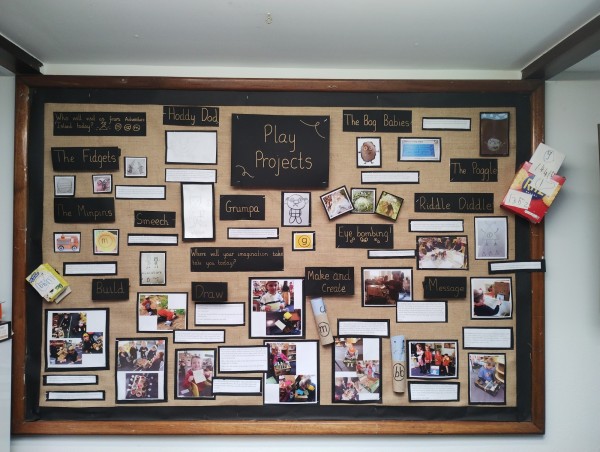
Babble Jab
Babble Jab is a language game, and is a brilliant way to explore language, stimulate chat and develop inference and critical thinking as well as show children the hidden poetry of words.
Helicopter Stories
This is a child-led approach that encourages children to dictate their stories which are written down by the teacher exactly as they are told. The children then gather round a taped-out stage and the stories are acted out. This holistic approach uses the power of storytelling to develop key curriculum areas such as creativity, communication and language, personal, social and emotion skills in the EYFS, giving children’s stories a voice in a safe space. Through helicopter stories, we hope to create a culture of curiosity and wonder.
Poetry Basket
The Poetry Basket is a collection of poems that can be learned by heart over the course of a year. We find that learning poetry helps to develop children’s ear for language and learning poems together is an enjoyable way of experiencing the play of language. These poems are then sent home each week to be shared with families. Saying poems out loud emphasises the sounds and rhythms of language or the syllables contained in each word which is a vital part of learning to read. When reciting a poem with actions, children discover and use new words in a very natural way. Poetry develops the skill of prediction and as children recite poetry regularly, they strengthen their ability for memorising. The more poems that children hear and recite, the more capable they come of recognising and memorising patterns which is a vital part of early maths.
Phonics and Early Reading
At St Mary’s we believe that promoting a love of reading is intrinsic to a child’s education, development and happiness. We work with all children to ensure that this begins with the youngest members of our school community and continues throughout their time in school. As soon as a child joins St Mary’s, they are introduced to a literacy rich environment that ensures that we:
- Foster a love of reading and sharing stories, poems and rhymes to develop vocabulary and comprehension through Drawing Club, Adventure Island and Poetry Basket.
- Develop children's Communication and Language skills to ensure they can listen, attend and understand language through Helicopter Stories and Babblejab.
- Ensure children are taught early phonics skills through our systematic, synthetic phonics programme Read Write Inc.
- Create opportunities for children to read and reread books that match the phonics stage taught.
- Provide opportunities within Child Initiated, Adult initiated and Adult directed activities for the children to apply and rehearse early phonics and reading skills in a range of contexts.
- Effectively use assessment to quickly identify the children that need additional support to keep up through 1:1 tutoring and spotlighting during teacher input.
- To offer challenge to the children who are applying and using phonics skills early on in their school journey to ensure we nurture and continue to move children forward to achieve.
Early reading and phonics skills are nurtured and developed across the continuous provision, giving children the opportunity to apply their skills in a range of play-based activities and meaningful contexts. We use Drawing Club, the Message Centre and Play Projects to ignite imaginations and the adults are highly skilled in working at the cusp of children’s learning, providing guidance, support and challenge to children as they practice and consolidate these early reading skills.
Alongside the continuous provision, the following sessions are planned to ensure children develop strong Communication & Language, Phonics, reading and writing skills, during their time across EYFS and Year 1.
- Children in Reception and Year 1 will complete a daily phonics session, following our synthetic and systematic phonics programme: Read Write Inc.
- Children in EYFS will enjoy a daily Drawing Club with a different book shared each week.
- Children in EYFS and Year 1 will enjoy an end of day story to develop and foster their love for reading. These books are often linked to our school value for the term or our connected curriculum.
- Weekly 1:1 reading will take place in Reception and in Year 1. Guided reading will also take place weekly for all children accessing the Read Write Inc scheme.
Phonics in more detail
Our Phonic Program, Read, Write, Inc enables us to ensure children learn to read fluently and at speed so they can focus on developing their skills in comprehension, vocabulary and spelling. Through assessment and early intervention through tutoring we can ensure children in Year 1 are equipped to pass the Phonic Screening Test and that no child is left behind in their phonic learning journey.
How we teach Phonics
At St Mary’s, Phonics is taught through the scheme Read, Write, Inc. Read Write Inc. was first created by Ruth Miskin in 2002. It is the UK’s leading synthetic phonics programme. Read Write Inc. is for children from EYFS to Year 4, and children with SEND in older year groups. Phonics is taught daily to all children in EYFS, Year 1 and those in Year 2 who have not passed the phonics screening in Year 1 or completed the Read, Write, Inc phonics programme.
RWI promotes good progress for all children and works at a pace right for the individual child.
The children in EYFS begin their phonics journey as soon as they start school full time, learning phonic sounds in daily phonic sessions and how to blend these sounds together to both read and write new words. Once the children can blend they begin reading Red Ditty Books and as their fluency increases, they move fluidly through the scheme finishing with grey book. All reading books progress cumulatively, matched to the sound’s children are learning and already know.
Read, Write Inc Reading Scheme Books
The teaching of phonics is of high priority. During each daily RWinc session, the children are taught or revise a phonic sound, learn to segment and blend story green words with the support of Fred who only speaks using Fred Talk, read on-sight story red words and work on their reading fluency with a reading partner, applying phonics to read decodable books. The books will come home after being read in school with their reading partner for the children to share and continue to practise their reading and fluency at home.
Each classroom has a speed sound chart displayed and used during and around explicit phonic sessions, in EYFS and KS1 table top phonic mat resources are always available as well as individual phonic cards in EYFS.
How is phonics assessed at St Mary's?
Children are assessed each term using the RWi assessment. The assessment ensures children are making progress with their fluency and from this they can be moved into the phonic group most suited to them. Meanwhile, phonic teachers are assessing children’s phonic recall, segmenting and blending and fluency during each session and children move fluidly between the groups accordingly between assessment points. We continually ensure the children are making progress and where necessary we begin daily tutoring as we believe children should keep up not catch up.
Story time – Talk through stories and vocabulary time (Read Write Inc)
In order to continue to develop our children's love of reading we share a wonderful range of stories with the children on a daily basis. The aim of this is for the children to fall in love with the stories we share. When the children know the story well, we are able to have fun talking about the characters, their actions, feelings and motives. We use favourite phrases from the story every day, freeze-frame feelings and quiz the character. During the school day we explore vocabulary from the story and encourage the children to use it in their play. Vocabulary time is designed to extend and deepen our children’s vocabulary to ensure that they can understand the books they will be able to read for themselves.
We try to develop a real sense of awe, wonder and excitement around books. The children visit the school library every week to choose a new book to share at home and we have a magical cupboard that often appears in the classroom with a new book inside to share and enjoy.
Mystery Reader
In the EYFS we love to share our love or reading with members of our school community. Each week we open our doors for parents, family members and friends to come in and share their favourite books with the children. We call this 'Mystery Reader' and the children absolutely love the build up and anticpation in discovering who it will be.
NCETM Mastery in Maths
In the EYFS, our objective is to ensure that all children develop firm mathematical foundations in a way that is engaging and enjoyable. The materials we use are based on international research. They are organised onto key concepts which underpin many early years mathematics curricular. There are 6 key areas of early mathematics learning:
- Cardinality and counting
- Comparison
- Composition7
- Pattern
- Shape and space
- Measures
Our lessons take the following format:
- A revisit
- Teach and practise
- Small group work to consolidate, support and challenge using concrete manipulatives which are then rehearsed and applied to their own learning during ‘Explore and Learn’ time.
Maths Meeting
We run a daily maths meeting in order to consolidate key areas of mathematics and develop fluency in recall of key knowledge. The maths meeting covers several curricular areas, broken into short segments. We use our assessment to inform the content.
Additional Support
Our inclusive approach means that all our children learn together but we do have a range of additional interventions and support to enhance and scaffold children who may not be reaching their full potential or moving on children who are doing very well. This includes, for example, Neli activities, Colour Semantics, Speech and Language, Magic Maths Club, Guided Reading, Cube Club, Pinny time (phonics) and Thrive.
Capital Culture
Cultural Capital is the essential knowledge that children need to prepare them for their future success.
In our setting we aim to broaden our children’s horizons through our curriculum. We offer experiences that will benefit the children both in the present and the future and that will extend and stretch them and allow them to challenge themselves.
We plan exciting trips, invite interesting people in to talk to us from the local community, have strong links with our local food bank, police and fire services.
We want to celebrate the uniqueness of us all and share our differences and individualism. Our world is vibrant and diverse and we try to bring some of this into our EYFS classrooms through our exploration of Festivals and cultural celebrations. When a child shares with their friends how they celebrate a festival or take part in a celebration, a child's self-confidence and self-esteem is developed, and children's awareness of, and respect for, others' beliefs is nurtured.
Each year our Reception children perform to their families and friends at Christmas time and at our end of year 'Celebration Assembly'. As the title suggests, the children are able to showcase all of their amazing learning that has taken place throughout the year.
All our activities, resources, enhancements and provocations are designed to enhance vocabulary, build curiosity, create a sense of awe and wonder and engage children with delight and enthusiasm and thus strengthening cultural capital. According to Greg Bottrill (2018, p40):
“Children need an inspirational environment that changes and includes quirky objects and things that lie outside the ordinary. They need to hear words that are strange and alluring, hear stories that open up new worlds of imagination and wonder; they need drama and songs, adventure and the great outdoors. These are what you can bring every single day. Think like a child to be like a child.”
Our ‘Connected Curriculum’ which is driven by the National Curriculum objectives and the Oxfam Global Themes and skills provides the children with a rich and broad global curriculum. Each term we have a question that we pose to the children and through our Drawing Club and end of day books explore it. We work towards a product outcome that brings all the learning together.
Through our exploration of a specific value each time and our brave change maker skills which we embed and frequently refer to in our daily practice, we are developing well-rounded, globally aware citizens that know they can absolutely make a difference in this word.
British Values
In the EYFS we seek to reinforce British values through our Curriculum, the Characteristics of Effective Learning, Jigsaw/PSED and our Brave Changemaker skills.
Democracy
In our setting, this is all about making decisions together. Our approach encourages children to help them understand that their views count and that they should express them. By encouraging the children to express their views, we are teaching them to value each other’s and talk about their feelings. Opportunities for the children to express their views are plentiful throughout each and every day. We operate a voting system for our daily story book. Our Story Dough and Drawing Club sessions always generate much discussion and we use ‘Talk Partners’ and ‘Circle Time’ to explore our views in greater detail. We love to embark upon ‘Babblejab’ discussions at the end of the day where everyone’s ideas, thoughts and opinions are welcomed and celebrated.
The Rule of Law
To help children manage their feelings and behaviours, we support children to understand their own behaviours and that of others through a range of carefully chosen stories, games and role play activities. In order to help the children understand the importance of rules, we involve them in the process of creating the classroom rules and then making a video to share with the school community about their importance in term 1. In term 2 we consolidate our understanding of rules and actions through a visit from a police officer.
Individual Liberty
Children are encouraged to make choices, knowing that they are in a safe and supportive environment. We provide opportunities in the provision to help the children develop their self - knowledge, self-esteem and increase their confidence in their own abilities. We do this by allowing the children to take risks indoors and outdoors.Each day we find time to have small discussions with the children about how they feel about certain things, as we know that this will enable the children to explore the language of feelings and it gives them the opportunity to express themselves and understand that everyone is unique and other children have different opinions.
Mutual Respect and Tolerance
Respect is one of our core values here at St Marys and we encourage the children to treat others as they would like to be treated themselves. We believe that this is essential to being part of a community, managing feelings and having meaningful relationships. We actively promote diversity through our celebrations of different faiths and cultures throughout the year. Children are encouraged to share stories of their home that reflect the values and the diversity of their experiences. We also invite guest speakers into our provision, to raise the children's awareness of religion, traditions, cultural heritage and preferences further. We love to share stories and resources with the children that value the diversity of their experiences.
Outdoor play
We know that outdoor learning boosts confidence, self-esteem, social skills, communication, motivation, physical skills, knowledge and understanding, to name but a few , and this is why children have regular opportunities to explore the outdoor environment. We weave our characters from Adventure Island into the outdoor provision to bring it to life, to make it an exciting landscape for children to explore and learn through. We value the natural resources in our environment and encourage children to stop and notice, and to think creatively about how they can use such resources.
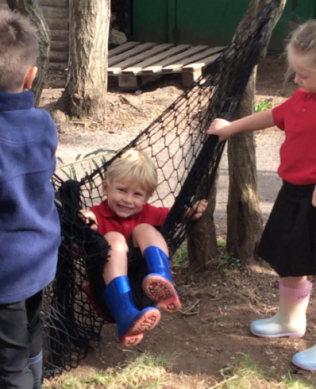
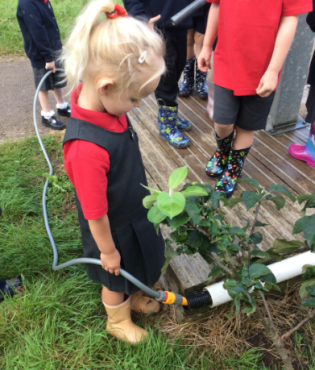
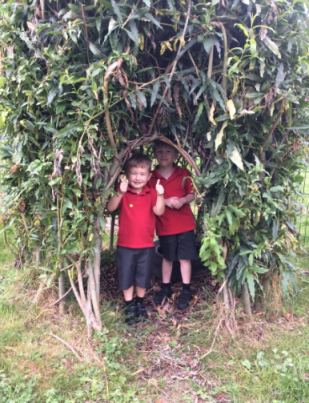
Physical Development
We use a scheme called PE Planning, which provides a broad and balanced scheme as well as being active and engaging. In one session per week, across the school year, we cover:
- Ball skills,
- Dance
- Fitness
- Fun and games
- Movement development
- Throwing and catching
- Working with others
These are all excellent for working on the larger muscle groups, to enhance children’s gross motor skills. We also use a programme called Smart Moves to further support the development of gross motor skills.
Squiggle while you wiggle
Squiggle while you Wiggle uses neurological and physiological movement to create marks. All the children access the programme at the beginning of the year in preparation for writing and some will continue to explore the programme for as long as is needed.
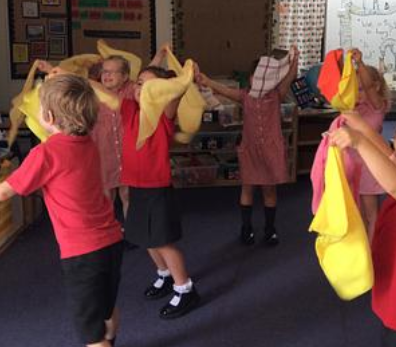
Understanding the World
The EYFS curriculum for Understanding the World is taught in a variety of ways through both adult and child led and adult supported tasks, exploring well-resourced provision both indoors and outdoors. Each area of the classroom and outside space has been carefully considered to ensure we are offering the children a broad range of experiences that link with the children's interests. Regular skills audits ensure that the setting is both supportive and challenging for our children.
In reception we use the Jigsaw scheme for our PSHE curriculum, which is then continued up through the school and gives a clear familiar base for the teaching of PSHE.
Our reception jigsaw piece is called Jigsaw Jenie and is used to enable the children to express their own ideas, feelings and thoughts during circle times if they want to (there is always the option not to say anything when Jigsaw Jenie is past round the discussion circle). This encourages good turn taking and helps develop the children’s speaking and listening skills.
The following link shows the skills and knowledge progression that Jigsaw covers over each termly piece.
Ages 3-5 Jigsaw skills and knowledge progression for parents
Thrive in the EYFS
As soon as the children come into our setting they are immersed in the language of Thrive. We use the Thrive approach to develop our children’s social and emotional wellbeing. Emotional regulation resources greet the children each morning and they encourage them to express to us how they are feeling. This enables us as practitioners to ‘check in’ with children who may be feeling sad or upset upon arrival. Understanding our emotions and feelings and what these are doing to our bodies, and having the language to describe this is a vital skill we teach the children in our setting. We know that being able to manage emotions is critical for academic achievement and mental health, so we give the children the tools to be able to deal with all emotions in an easy to access way.
Impact – how do we know what our children have learnt and how well they have learnt it?
Our Curriculum needs to meet the needs of our children, including our disadvantaged pupils and those with SEND, so we take time looking at and evaluating how well our children are learning. We carry out regular skills audits in the provision, to ensure it is meaningful and beneficial to the children in our classes. We achieve this by talking to the children, looking at their work, observing their learning experiences and analysing data. Each member of staff uses ongoing observational assessment in order to identify children’s starting points. We use the 3M’s document to track progress and identify next steps to ensure that knowledge and skills are built cumulatively.
At three points in the year we update the progress the children have made on our tracker system and carry out a gap and strength analysis. This information enables us to assess the impact of teaching thus far and decide what to put in place moving forward to ensure the best outcomes for all the children.
In addition to this we formally assess phonics termly enabling the children to be reading at the appropriate level as well as highlighting any gaps in their phonic recognition.
Our curriculum and its delivery ensures that children make excellent progress during their time with us, so that the cohort exceeds the national expectation for GLD at the end of the year. We believe that our children are so successful due to our child centric, play-based approach alongside a rigorous assessment system and high quality teaching. We make learning meaningful, purposeful and full of joy ensuring all our children are active, engaged and curious learners.
